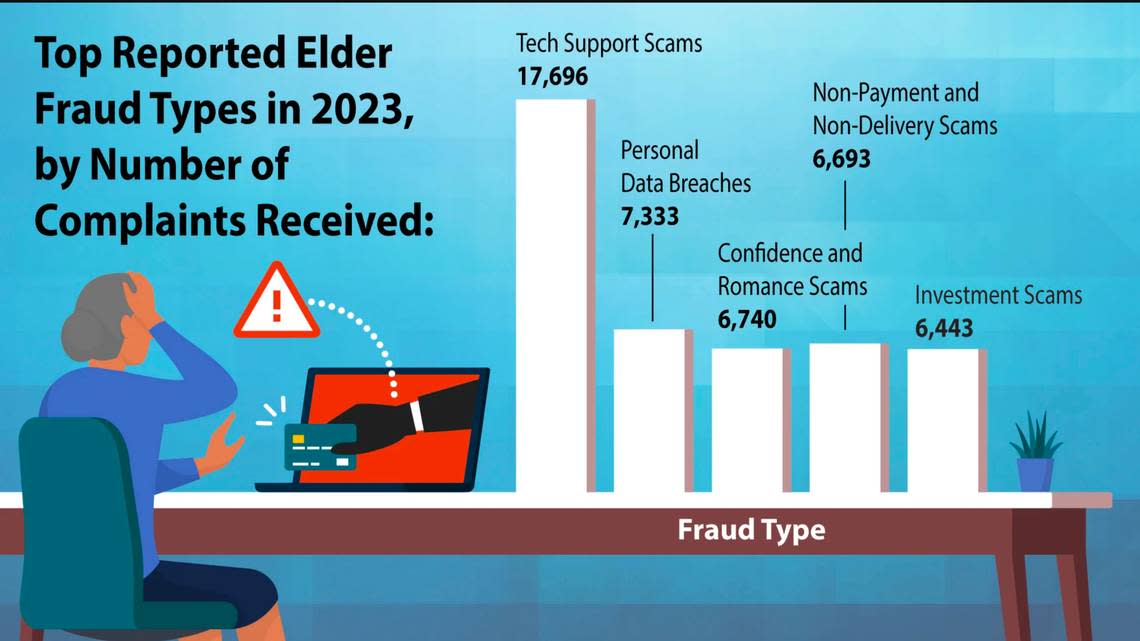NC Lyft driver caught up in ‘grandparent scam’ saved grandfather from losing $6,500
Lyft driver Lori Kimbler was worried about the man who wobbled on a cane to her car and asked for a little more time but never returned. So she knocked on his door to make sure he was OK.
The 79-year-old man was sitting at a kitchen table covered with cash.
“I’m still counting the money,” Kimbler said he told her.
“Can you help me?” he asked, frantic and struggling to count out the bills as his hands shook, she said.
A Lyft driver based in eastern North Carolina, Kimbler had accepted a fare to pick up a person, who later called and said she would actually pick up important “paperwork” from a Pamlico County home.
“I didn’t think I was bringing that kind of paper,” she said of the scene she witnessed in the man’s kitchen.
It’s a scheme that Kimbler, the man’s family and law enforcement say older North Carolinians must guard themselves against.
The phone call
Around 4 p.m. on April 26, the man, who asked that his name not be published, received a phone call from who he thought was his grandson, he said in a phone interview.
The caller said he had a broken nose, stitches in his lip and a broken leg after he was in a crash. And police found an open bottle of alcohol in his car.
The voice didn’t sound like his grandson, the man said, but he figured the injuries affected his voice.
Just as the man hung up from that phone call, the phone rang again, he said. A next caller asked for $6,500 to get his grandson out of jail, which the grandfather would get back after his grandson goes to court.
The caller said a Lyft driver would pick up the money. The man, who his grandchildren call Pops, had just enough time to get to the bank before it closed, so he went.

That’s when Kimbler got involved. The Lyft fare was prepaid. The customer said her name was Marabell, that she worked for an attorney and that she wanted the “paperwork” delivered to Raleigh.
After Kimbler entered the man’s home, she helped him stuff $6,500 in four envelopes. She also wrote out a makeshift receipt, giving him her name and telephone number.
But as she drove off with the money, the 66-year-old mother of three started to worry.
“It didn’t feel right,” she said.
Scammers tracked the driver
About 10 minutes into her drive to Raleigh, Kimbler pulled over to a gas station to fill up. Suddenly “Marabell” called, asking her why she stopped.
When Kimbler stopped again a few minutes later, just to see what would happen, the woman called again. The tracking made Kimbler even more suspicious.
Kimbler called Lyft to ask if drivers could even deliver money. A person put her on hold for 20 minutes and then the call was disconnected, she said.
That’s when Kimbler reached out to the man and suggested they reach out to his grandson, she said.
The man did. The grandson, it turned out, was not in jail. He was driving with his girlfriend Hannah Watts, 24, en route to a vacation in Wilmington.
“Well, I just sent $6,500 out the door to get you out,” the man told his grandson, Watts said during a phone interview.
The couple spoke to Kimbler and asked her to return the money. She called New Bern police, she said, and they forwarded the call to Pamlico County Sheriff’s Office. She asked someone from there be present when she handed over the cash, just in case the scammers were still tracking her.
Deputies met her at the man’s home, Pamlico County Sheriff Maj. Scott Houston confirmed.
The grandparent scam
As it turns out, Kimbler disrupted what law enforcement calls the “grandparent scam.”
The scam goes back years, with the FBI receiving reports about it since at least 2008.
The situation often involves a caller pretending to be a family member, often a grandchild who needs bail and doesn’t want their parents to know.

Scammers use whatever tools they can to convince older Americans and improve their chances of getting the money by gleaning family member details off social media or using technology that can clone voices, disguise phone numbers and create fake mug shots, according to federal reports.
A more recent twist involves scammers obtaining the cash by sending unknowing drivers for rideshare companies like Uber and Lyft to pick up the cash, something the FBI warned about in 2021.
Nazneen Ahmed, a spokesperson for the North Carolina Attorney’s General’s Office, which investigates fraud against older residents, last week said officials in her office aren’t aware of grandparent scam complaints involving rideshare drivers here.
But it’s happened elsewhere. In April, an 81-year-old Ohio man received a call about his nephew being in jail, and then shot the Uber driver sent to pick up the cash.
There have been some recent federal indictments and convictions for these scams in the Northeast, which demonstrate the perplexity of some of the fraud operations.
On Feb. 29, 2024, a Bronx, New York man was sentenced to nearly seven years in federal prison for his role in recruiting and coordinating couriers as part of a Dominican Republic-based grandparents scheme operation preying on individuals in Pennsylvania, according to the U.S. Attorney’s Office there.
On April 30, 16 people were charged in New Jersey federal court with various crimes, accused of operating a sophisticated network of call centers in the Dominican Republic who defrauded elderly in several states of millions of dollars, according to the New Jersey’s U.S. Attorney’s Office.
The fraud included “openers” impersonating family members saying they were in trouble and “closers” who said to send cash through the mail or couriers.
Response from Lyft
When contacted about the incident, a Lyft spokesperson wrote that looping drivers unknowingly into scams is “unacceptable and not tolerated” by the platform.
The spokesperson said they have been in contact with Kimbler but did not respond to questions about whether it is appropriate for drivers to deliver cash.
Kimbler said the company told her after the fact that it’s suggested that they not deliver packages, but she doesn’t think that’s enough.
Lyft should send out a mass email informing drivers about the scam and what they should do if someone tries to solicit drivers to be unknowing participants, she said.
“Drivers need to realize that stuff like this goes on,” Kimbler said. “If it feels like something’s not right, go with your gut, because it’s probably not.”
On Thursday, Kimbler said the incident, along with a situation in which she was groped by a passenger in October, has made her reluctant to sign on to drive, even though she needs to make her rent.
“This has made me very afraid and nervous,” she said. “You don’t know who is getting in the car.”
If you or someone you know is a victim of this and other scams, state and federal officials recommend you report them to the North Carolina Department of Justice, the FBI’s Internet Crime Complaint Center and through the National Elder Fraud Hotline.
Virginia Bridges covers criminal justice in the Triangle and across North Carolina for The News & Observer. Her work is produced with financial support from the nonprofit The Just Trust. The N&O maintains full editorial control of its journalism.
NC Reality Check is an N&O series holding those in power accountable and shining a light on public issues that affect the Triangle or North Carolina. Have a suggestion for a future story? Email realitycheck@newsobserver.com
